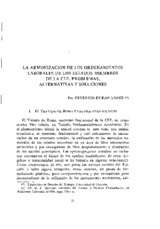La armonización de los ordenamientos laborales de los Estados miembros de la CEE: Problemas alternativos y soluciones

Ver/
Autor
Durán López, Federico
Editor
Centro de Estudios Políticos y ConstitucionalesFecha
1990Materia
Seguridad SocialDerecho Laboral
Europa
Política social
Tratado de Roma
Paises de la Unión Europea
METS:
Mostrar el registro METSPREMIS:
Mostrar el registro PREMISMetadatos
Mostrar el registro completo del ítemResumen
The minor weight of «social aims» in the Treatt of Rome, has brought about an overdue and scarce development of Social Community Law. Except for some particular aspects (equal treatment, freedom of movement) on which some others factors do have an influence, social standards have, within the limits of the Community, a truly modest scope, restricted to certain questions connected with critical situations in undertakings. Notwithstanding this, the incipient evolution of Social Community Law which carne about in the mid 70's, runs during the following decade into insuperable difficulties which have prevented its development. The Single Act, moreover, furnishes just a few limited and restricted novelisties (especially in the field of labour health), and it keeps up, in the essential), the precedent situation. However, the prospects of econoinic and monetary unión give rise to the issue of the harmonization of labour market regulations on a Community-wide basis. In this paper we analyze the requirements created by economic unión in the field of the working conditions regulation, and we study the different proposals related to this question: a harmonization of mínimum standards, based in the consecration of just some human rights; a harmonization of aims taking into account the special features of domestic law; a harmonization by way of the implementation of international treaties in forcé; and a sharper harmonization in order to promote the unification of the mechanisms regulations the working conditions. Great stress is laid on this last kind of harmonization, technical and politícal difficulties are pondered, and the adequate ways to progress in the adequate ways to progress in the consecution of this harmonization are proposed.
